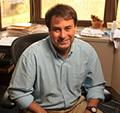
When I finished writing the Joseph Brennan obituary for our winter print edition, I knew I had more to say. It has gone unsaid for decades, and it’s too late now.
Back when I was an English major, I took a class under Joe Brennan, the scholarly and erudite English professor who taught here for almost four decades. He died in October at age 86.
The class was Willa Cather. I had never heard of Willa Cather before I signed up for that class, but the description of her work interested me. She wrote novels about the pioneers of the Great Plains, the West, the making of America. I became a big fan of hers.
There were only five of us in the class that met for three hours each Monday night in Professor Brennan’s house just north of campus. Each Monday evening we drove together to his home where we sat in his study and talked about Cather and her work.
Well, to put it more accurately: Brennan talked. The rest of us sat in silence. He talked and talked, the poor guy, occasionally sipping from a small glass of sherry, for damn near the full three hours.
It wasn’t that he wanted to. He tried to get us talking. He asked questions, he practically begged for our answers, our thoughts, some indication of interest, even some sign of life from us.
And we — as shy, self-conscious and dunderheaded as seventh-graders at their first dance — sat lumpishly red-faced and mute. He probably could not have selected five more bashful, more reticent, more painfully asocial creatures had he run a campus contest to find them.
So each week, periodically imploring us to respond, he would fill the time by speaking — brilliantly, insightfully and (most importantly) engagingly — about Cather and literature and the arts and all manner of ideas that elevated our thinking. And each week we’d pile back into the car and on the short trip back to campus thwap each other upside the head for being such opaque lunkheads.
“But he’s great to listen to,” we’d say, and promise to all be better next week.
It wasn’t that we weren’t reading the material. Sometimes we’d stand in the parking lot after class and discuss the books, the passages, things the professor had said. We just didn’t do it with him, even though we felt bad about it.
But each Monday night we’d be back in his study, politely declining his gracious invitation to share his sherry, perched in straight-back chairs, as quiet as stone.
Our one writing assignment for the class was a 25-page term paper on the subject of our choice. I chose to write about nature in Willa Cather, and he proclaimed the subject much too broad for a mere 25 pages. “Trees,” he suggested. “Write about trees in Willa Cather’s work.”
“Huh?” I replied.
At which he was happy to explain the significance of cottonwoods on the plains, what pinon pines meant to people in the Southwest, and the symbolism of flowering fruit trees to pioneers establishing homesteads on the prairie. Following his lead and running through a semester’s bounty of literature was one of the great awakening moments of my life.
I doubt I ever said more than 50 words to Joseph Brennan, even though he opened his home, his mind and his world to me, and opened my world a considerable amount as well.
In the decades I’ve been here since, I’d see him occasionally, walking with that signature limp through the grocery store at night or making his way around the track at Loftus. I never said a word to him.
I never thanked him for what he had given me. And I never apologized for being so dismally quiet in his study that semester that must have worn on him, tested his enthusiasm, if not his resolve, facing the five of us each Monday night. Now I regret the silence more than ever.
I figure by now I’ve taught maybe 40 semesters of college classes, and I get it. I understand how hard that transaction is between teacher and student. And I understand how nice it is when a student speaks, and later acknowledges your gifts, however meager.
I was thinking all this when I was writing Joe Brennan’s obituary, regretting that I had not reciprocated in some small way over all these many years.
Kerry Temple is editor of Notre Dame Magazine. Email him at ktemple@nd.edu.